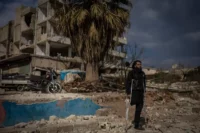La Syrie n’intéresse-t-elle l’Occident que lors de frappe israéliennes ?
La Syrie a disparu des radars médiatiques et ne revient au-devant de la scène que lorsque des frappes israéliennes visent les responsables des milices iraniennes dans le pays. Une certaine angoisse semble saisir les experts du Moyen-Orient à chaque fois qu’Israël frappe les cadres des milices iraniennes sur le territoire syrien. Pendant plus d’une décennie, ces milices ont semé la mort et la désolation aux côtés d’Assad, contribuant au changement démographique du pays en installant leur propre famille en lieu et place des millions de Syriens qu’ils ont chassés de leur terre. Mais l’inquiétude vis-à-vis de l’impérialisme ne semble émerger chez certains commentateurs que lorsque ses architectes sont ciblés...… Seguir leyendo »

















